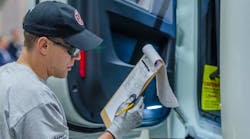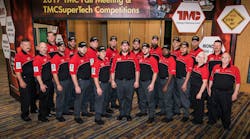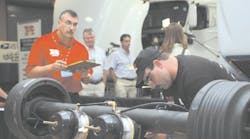Some would say nothing measures the success of a skilled technician quite like that of a standardized and scored competition among peers.
But, organizing and running a successful skills competition for your technicians can take a lot of preparation and organization.
There are a number of benefits both technicians, and the companies they work for, stand to gain from competing in an organized skills competition. For organizations interested in holding their own competition, there are steps to consider and resources available to ensure the success of an event.
The benefits
A skills competition helps identify, recognize and reward top performing technicians for their skills, abilities, aptitude and knowledge.
“One of the biggest benefits is to measure how your technicians are performing based on a somewhat objective standard,” says Robert Braswell, Executive Director of American Trucking Associations’ Technology & Maintenance Council (TMC). “It’s always good to know how you’re doing in comparison to others – your peers, and your competition.”
TMC is a technical council of the American Trucking Associations, Inc. (ATA), North America’s premier technical society for truck equipment technology and maintenance professionals.
TMC hosts the TMCSuperTech National Technician Skills Competition annually during TMC’s Fall Meeting.
“A big benefit of [technician skills competition] participation for companies is improved employee morale and better skilled employees,” Bonne Karim adds. A retired fleet training manager for the United States Postal Service, Karim was one of the first volunteers to chair the TMC Professional Technician Development Committee (PTDC), created in 2005, which runs the national competition. She is still actively involved in helping interested organizations – both fleets and state trucking associations – establish their own skills competitions.
Technician skills competitions can inspire technicians to work towards continuous improvement, and help to increase the visibility of career opportunities available.
“[One] goal was to provide an avenue for technicians to test themselves, identify areas of strength and weakness, and learn new things to improve their skills and performance on the job,” Karim explains, regarding the formation of TMC’s PTDC.
While the technician benefits from participating in a skills competition, the results can also provide insights to the entire maintenance operation. By evaluating the performance of technicians, it allows shops to adjust and improve their entire shop’s maintenance efforts.
Participating in technician skills competitions also allows employees to open a line of communication within their organization. At the national level, a skills competition provides technicians an outlet to network with other peers at different companies to increase knowledge.
“In many companies and locations vehicle maintenance is taken for granted,” Karim says.
When Karim managed the fleet maintenance operations at USPS, she confirms experience and feedback from technicians who competed in previous TMCSuperTech competitions helped improve the overall company culture. This holds true to the examples she sees today with other organizations.
“Once technicians and shops started receiving recognition through TMCSuperTech, management started taking notice and new avenues of communication were opened,” she says. “A big benefit has been networking among technicians from different companies... Instead of keeping information to themselves, they make friends, share ideas, problem solutions, etc. and even contact each other for technical support on difficult problems.”
Another benefit, according to TMC’s Braswell, is skills competitions can be good, clean competition.
“Certainly whatever you can measure can be fun as well,” he says. “That’s a kind of motivating factor for the technicians who are competing, not only at TMCSuperTech, the national technician skills competition, but also all of the feeder competitions that take place before that.”
A summary of the national skills competition
The TMCSuperTech National Technician Skills Competition is designed to determine and honor the industry’s top commercial vehicle technicians through a variety of troubleshooting tests and skills challenges.
“There are thousands of people who are competing and trying to see if they know as much as they think they know, and try to find out what it is they need to work on,” TMC’s Braswell says.
All diesel technicians are welcome to register and participate in the national competition.
He says corporate fleets and smaller operations alike hold their own company competitions, and oftentimes opt to send winners to the national competition. State-run competitions held through numerous state trucking associations also provide a means for technicians to advance to the national competition.
The competition itself consists of three specific areas: a written exam, pre-qualifying round and final round.
State trucking association skills competition winners automatically bypass the written and pre-qualifying rounds, to compete in the finals.
The written exam is based on tests by Automotive Service Excellence (ASE). The pre-qualifying round includes a number of tabletop and written exams. Participants are awarded points based on their written exam and pre-qualifying events. Participants with the highest scores move ahead to the finals, where they complete a number of hands-on skills stations.
“It’s actually working on bugged trucks, or bugged tractors,” Braswell explains. “We set up a problem, and you have to diagnose and do complaint, cause and correction.”
Each station has a panel of judges who award points based on set criteria reviewing skill and performance. A winner is announced for each station, as well as an overall winner for the entire competition.
“Hands-on skill stations are chaired by industry experts in different areas who design challenges to test specific skills, particularly those identified as critical to operational performance,” Karim says. “Challenges and stations vary from year to year. PTDC developed a guideline book used by station chairs to ensure consistency, fairness and integrity of the competition.
The traditional TMCSuperTech competition began in 2005 with a focus on straight trucks. But, in recent years, TMC has added additional tracks specifically for trailer technicians as well as a post-secondary student-focused competition known as TMCFutureTech.
Held at rotating locations around the U.S., TMC will host the 14th annual TMCSuperTech Skills Competitions again Sept. 15-20, 2018.
How to organize your own competition
There are a number of challenges that organizations may face when it comes to organizing their own technician skills competition.
“Identifying a venue, getting sponsorships to cover expenses, deciding on the number of workstations, and getting companies and technicians to participate are all challenges,” Karim confirms.
“Every state and company competition is a little different depending on what works for them,” she adds. “Some states hold [a technician skills competition] in conjunction with their Truck Driving Championship. Others have a separate event.”
There are a number of ways to conduct a skills competition, and it’s up to the organization to take the steps to create and conduct the event.
“It can be as simple or elaborate as you choose, as your resources make available,” TMC’S Braswell adds.
When starting the process, first review aspects of your maintenance operation and determine if there are any pain points or areas that could use improvement.
“Generally speaking, take a look at what are some of the major concerns in your operation? Where do you spend your maintenance dollars?,” Braswell says. “Those are the areas that you probably want to improve your performance in, and those are ripe targets for (hands-on) stations for your own technicians.”
Examples of different hands-on skill challenges include: electrical, brakes, HVAC, engine, steering, preventative maintenance inspection (PMI), drivetrain and service information.
A pool of volunteers and dedicated employees can aid in the success of the event as well. These individuals help to gather information to organize the event, coordinate with vendors and sponsors, establish testing criteria and stations and help to judge the competition itself, to name a few.
For continued advancement to the national level, Braswell says it’s important to consider the format of the TMCSuperTech National Technician Skills Competition when creating your own organization’s competition.
“Bear in mind, to the extent that you mirror the national competition, you’ll be more successful at the national level,” Braswell says.
One suggestion he makes is to encourage ASE certification for technicians.
“If you can be an ASE certified master technician, you’re probably a long way toward being able to compete at a high level,” Braswell says. “Just by having that level of knowledge, it puts you a cut above your peers that haven’t chose to go that route.”
In order to address these challenges, there are a number of resources available to interested organizations.
More information
For assistance with organizing a skills competition for technicians in a shop, TMC offers a free educational digital booklet with suggestions and detailed instructions. This downloadable PDF, How to Conduct a Professional Technician Skills Competition, can be found at VehicleServicePros.com/20982947.
Interested organizations are also encouraged to reach out to the TMC directly, where they will be put in contact with someone as a resource to provide more information.
Braswell says there are a number of volunteers who previously served on the PTDC – including Karim -- who will assist state trucking associations and companies with organizing their own skills competitions.





